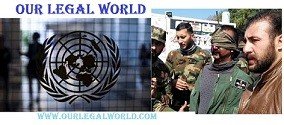Indo-Pak Conflict, 1949 Geneva Conventions can be invoked to bring IAF pilot Abhinandan Varthaman back
Ongoing Indo-Pak conflict after 14th February Pulwama terrorist attack, in which 40 CRPF personal killed. Pakistan-based militant group Jaish-e-Mohammad it was behind it.
Particularly after the Pulwama terrorist attack, Indian Air Force strikes on a various terrorist camp in Balakot in Pakistan on February 26, India’s said this air strikes is a non-military. Tensions grow along the Indo-Pak border.
Pakistan Says:
“India has committed ‘uncalled-for aggression’ by violating the LoC; Foreign Minister Shah Mahmood Qureshi says Pakistan reserves right to give ‘suitable response in self-defence’.”
Just after 24 hours IAF strikes on terrorist camp in Balakot (Pakistan), Pakistan jets had violated Indian airspace and dropped bombs. Pakistan jets entered border areas of Nowshera sector in J&K’s. Indian government said IAR jet of PAF in the Skirmish, and wreckage had fallen on Pakistan side, but Pakistan’s however, denied the loss of any aircraft.
The IAF pilot Wing Commander Abhinandan Varthaman, chase the Pakistani jests and push them back, when he had to eject over the LoC after the MiG-21 he was flying was shot by a Pakistani plane and then landed in PoK, where he was taken into custody.
The MEA said it is awaiting details of IAF personal arrest and condition through diplomatic and official channels, and demanded his “safe and immediate return”.
“India strongly objected to Pakistan’s vulgar display of an injured person of the IAF in violation of International Humanitarian Law and the 1949 Geneva Convention. It was made clear that Pakistan would be well advised to ensure that no harm comes to the Indian defence personnel in its custody.”
This brings us to the question of the procedure to bring back an Armed Forces personnel and Civilian who has been captured during War by enemy country. These guidelines have been furnished in the Geneva Conventions. Let’s take a look in Convention:
Geneva Conventions
The Geneva Conventions are a series of treaties concluded in Geneva between 1864 and 1949 for the purpose of ameliorating the effects of war on soldiers and civilians. The conventions were established as a result of Red Cross founder Henri Dunant pushing for negotiations to help the wounded in time of war in 1864.
What is the aim and objective of these conventions?
The convention has the following aims:
1. Immunity from capture and destruction of all establishments for the treatment of wounded and sick soldiers and their personnel
2. Impartial reception and treatment of all combatants,
3. Protection of civilians providing aid to the wounded, and
4. Recognition of the Red Cross symbol as a means of identifying persons and equipment covered by the agreement.
What is its relevance in the current Indo-Pak scenario?
Both India and Pakistan signed the convention, and ratified by the each country.
The third Geneva Convention 1949 required that belligerents treat prisoners of war (PoWs) humanely, furnish information about them, and permit official visits to prison camps by representatives of neutral states. This came to be known as the Convention Relating to Treatment of Prisoners of War, 1929.
It asserted that PoWs be given humane treatment and adequate feeding, forbidding the belligerents to apply undue pressure on prisoners to supply more than a minimum of information.
In 1977, the protocol to cover both civilians and combatants in the conventions was approved with the help of negotiations from the Red Cross.
But Neither the Indian MEA nor its Pakistani counterpart has identified the pilot as a PoW.
However, as per the third Geneva Convention or 1949 Geneva Convention , “The convention applies to all cases of declared war or of any other armed conflict which may arise between two or more of the signatories, even if the state of war is not recognized by one of them.”
Article 118, first paragraph, of the 1949 third Geneva Convention, “Prisoners of war shall be released and repatriated without delay after the cessation of active hostilities” and “unjustifiable delay in the repatriation of prisoners of war or civilians”
Article 13 of the third convention states:
Prisoners of war must at all times be humanely treated. Any unlawful act or omission by the Detaining Power causing death or seriously endangering the health of a prisoner of war in its custody is prohibited, and will be regarded as a serious breach of the present Convention.
Flight Lt Kambampati Nachiketa
During the Kargil War, Flight Lieutenant Kambampati Nachiketa was captured after his MiG-27 suffered a flameout while destroying enemy positions in the Batalik subsector.
Flight Lt Nachiketa was captured by Pakistan on May 27, 1999 and remained in Pakistani custody for more than a week. He was repatriated to India on June 3 of that year.








![Tax Law Internship Opportunity at Legum Attorney [Chamber of Ashish Panday], Delhi [Tax Litigation]: Apply by 2nd November](https://www.ourlegalworld.com/wp-content/uploads/2024/10/Legum-Attorney-Intern.png)
